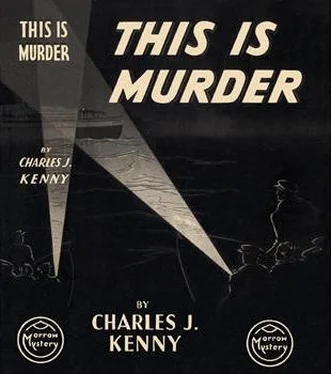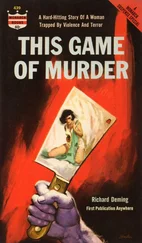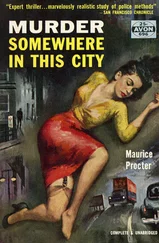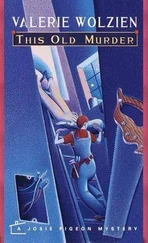“She might have been. She might have been really kidnapped, and then again the notebooks might have been stolen.”
The telephone rang. Sam Moraine mechanically reached for the instrument, but Barney Morden lunged forward as though he had been a football player retrieving a fumble, grabbed the French telephone, and said, “Hello, what is it?”
The receiver made squawking noises.
Morden said, “Yes, this is Barney talking. The Chiefs right here.”
The receiver made more noise, and Barney frowned and said, “Now, listen. She must have left there in a private car or in a taxicab. If she went in a private car, someone must have telephoned her and arranged to pick her up. If she went of her own free will, she went in a taxicab. Now you fellows start checking on that angle, and...”
He broke off as the receiver chirped into additional noise.
Barney scowled for a moment and said, “I don’t think that changes the situation any. I’ll talk it over with the Chief and call you back if it does. You concentrate on the taxicabs... Hell, I don’t care how she was dressed. She had to leave, didn’t she? She didn’t fly out of the window, even if she had nothing on but panties.”
He slammed the receiver into position, looked at Duncan meaningly and said, “I want to talk with you a minute, Chief.”
“Want me to go out?” asked Moraine.
“No,” Duncan told him, “stay here. What was it, Barney?”
Morden hesitated a moment, then said, “They’ve been checking up on the apartment to find out what she wore when she left.”
“Well, what did she wear?”
Barney said, moodily, “As nearly as can be found out from what’s left, she wore a close-fitting brown hat, a mink coat and a brown wool sports dress.”
Phil Duncan frowned, made no answer, but started pacing up and down the floor, his hands pushed deep into the side pockets of his coat.
After a moment Sam Moraine took the cards and dropped them into the drawer of his desk. The phone rang again.
Barney Morden’s hand had been resting within a few inches of the telephone. He picked it up, said, “Hello,” frowned a moment, looked at Moraine suspiciously, then shifted his eyes to Phil Duncan.
“It’s for Moraine,” he said, “a woman calling.”
Morden was still looking to Phil Duncan for instructions, when Sam Moraine grabbed the receiver from Morden’s hand. Morden tightened his grip on it for a moment, and Duncan said, irritably, “Snap out of it, Barney. Are you crazy?”
Barney Morden started to say something, but caught himself. Moraine said, “Hello,” into the transmitter, and heard Natalie Rice’s voice quivering with some emotion.
“Mr. Moraine?” she asked.
“Yes.”
“Please come out here. Get out just as quickly as you can.”
“You’re at that place?” he asked.
“Yes, yes.”
“Wait a minute,” Moraine said, “it isn’t going to be easy for me to come out. Are you where you can talk?”
He heard a rumble which seemed to grow in volume, heard her voice crying, almost hysterically, “Come out, come out! Come out at once! You must come. I don’t know what to do. I can’t hear a word you say. Please don’t let anything stand in the way. Come!”
Moraine could hear then that she was crying, could hear some other vague noise coming over the wire. Then suddenly there was a click, and the connection was broken.
Moraine dropped the receiver back into place, stretched, yawned, and looked at his watch.
“No poker?” he asked casually.
“No poker,” Duncan said, watching his face intently.
Moraine looked at his wrist-watch. “How many more calls you boys got coming in?”
“We don’t know.”
“How long are you going to be here?”
“We can’t even tell you that.”
Moraine yawned once more.
“You were right, Phil,” he told the district attorney.
Duncan raised his eyebrows.
“Right,” Moraine went on, “when you said handling this kind of work was a chore. It interested me last night, but I’m commencing to get fed up on it. Perhaps the novelty is wearing off, or perhaps I haven’t had enough sleep to make me feel normal. And I’ve a sweet day ahead of me to-morrow... Tell you what I’ll do. I’ll go on home, and you boys can make yourselves at home here in the office. Pull the door shut when you go out. It has a spring lock on it. The telephone’s connected so any incoming calls will ring on this instrument here on my desk. The bottle of brandy is half full. If there’s any left when you leave, put it in that lower right-hand drawer because I don’t want to tempt the janitor in the morning.”
Moraine yawned once more as he went to the coat closet and struggled into his overcoat.
Adjusting his tie in front of the mirror, he caught a glimpse of Barney Morden’s reflected features. They were twisted into a grimace, as he strove to convey some wordless communication to the district attorney.
Moraine turned around quickly. Barney Morden sat perfectly motionless.
“Feel you’ve got to leave?” Duncan asked.
“I feel that I should, yes, Phil.”
“No kidding,” Duncan told him. “It’s an imposition for us to use your office, but I wanted some place where we could be assured of absolute privacy. If we find this Hartwell woman, I may want to bring her in here for questioning.”
Moraine opened a small drawer in the desk, took out a key.
“This key,” he said, “fits the corridor door.”
“Thanks, Sam.”
Moraine buttoned up his coat, drew on his gloves, and said, “Well, boys, be good. Make yourselves at home.”
“Watch your step,” Duncan called after him.
Barney Morden said nothing.
Moraine twisted the brass knob which controlled the spring lock. He opened the door, stepped into the corridor, and suddenly recoiled as something near his left hand swirled into motion. He caught a glimpse of a man’s crouching figure.
“Damn you!” said a mans nervous, high-pitched voice. “Get a load of this!”
Moraine saw light glitter from nickel-plated steel, as a gun was pushed into his stomach. He sensed the stiffening of elbow and shoulder against the jar of a recoil. He lashed out desperately with his left hand. The blow caught the man on the cheek bone, staggered him slightly off balance.
His motions impeded somewhat by the top coat which flapped about his legs and restrained the free swing of his- shoulders, Moraine shot across a right hook. It was a glancing blow. He could hear the other man’s labored breathing, saw him lunge. Light caught the drawn face, showing the red-rimmed, bloodshot eyes, pale skin, the angle of an unshaven jaw. There were haggard circles under the eyes.
Richard Hartwell.
Moraine caught the wrist that held the gun, turned it downward. Barney Morden came through the door on the run — a hundred and ninety pounds of beef and action. His right fist struck with a smashing impact. Moraine felt Hartwell’s arm grow limp in his grasp, saw the man sink to the floor.
Barney Morden stooped, grabbed him by the collar.
“What the hell!” he said, and dragged the inert form into the office.
A nickel-plated revolver lay on the floor of the corridor. Phil Duncan picked if up, looked at it, frowned, broke the cylinder open and stared at Moraine with a puzzled expression on his countenance.
“It isn’t loaded,” he said.
Hartwell stirred on the floor, opened his eyes, sighed. Morden prodded him with his foot. “What the hell’s the idea, guy?” he asked.
The man moaned and said nothing.
Duncan looked inquiringly at Sam Moraine.
“That,” Sam Moraine said, “is Dr. Richard Hartwell.”
“And we’ve been looking all over hell’s half-acre for him!” Barney Morden exclaimed. “And so have the federals. The son-of-a-gun was parked outside the door, waiting for Sam to come out so he could shoot a load of lead into his guts.”
Читать дальше








